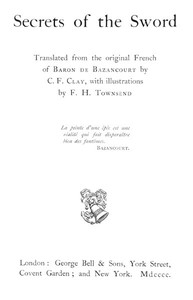Secrets of the Sword by baron de César Lecat Bazancourt
Read now or download (free!)
| Choose how to read this book | Url | Size | ||||
|---|---|---|---|---|---|---|
| Read online (web) | https://www.gutenberg.org/ebooks/46093.html.images | 282 kB | ||||
| EPUB3 (E-readers incl. Send-to-Kindle) | https://www.gutenberg.org/ebooks/46093.epub3.images | 904 kB | ||||
| EPUB (older E-readers) | https://www.gutenberg.org/ebooks/46093.epub.images | 906 kB | ||||
| EPUB (no images, older E-readers) | https://www.gutenberg.org/ebooks/46093.epub.noimages | 140 kB | ||||
| Kindle | https://www.gutenberg.org/ebooks/46093.kf8.images | 2.0 MB | ||||
| older Kindles | https://www.gutenberg.org/ebooks/46093.kindle.images | 2.0 MB | ||||
| Plain Text UTF-8 | https://www.gutenberg.org/ebooks/46093.txt.utf-8 | 247 kB | ||||
| Download HTML (zip) | https://www.gutenberg.org/cache/epub/46093/pg46093-h.zip | 884 kB | ||||
| There may be more files related to this item. | ||||||
About this eBook
| Author | Bazancourt, César Lecat, baron de, 1810-1865 |
|---|---|
| Illustrator | Townsend, F. H. (Frederick Henry), 1868-1920 |
| Translator | Clay, Charles Felix, 1861-1947 |
| Uniform Title | Secrets de l'épée. English |
| Title | Secrets of the Sword |
| Note | Reading ease score: 64.2 (8th & 9th grade). Neither easy nor difficult to read. |
| Credits |
Produced by Paul Clark and the Online Distributed Proofreading Team at http://www.pgdp.net (This file was produced from images generously made available by The Internet Archive) |
| Summary | "Secrets of the Sword" by Baron de César Lecat Bazancourt is a historical instructional text on fencing, likely written in the late 19th century. This work explores the art of swordplay, aiming to simplify its practice and highlight its mental and physical benefits. Bazancourt’s narrative emphasizes the need for instinct and quick judgment in fencing, presenting it not just as a technical skill but as an engaging intellectual exercise. The opening of the book begins with a preface that sets the stage for a discussion of fencing, inspired by an informal conversation among friends. The Baron reflects on how a casual talk spiraled into a deeper exploration of the art of fencing, where he shares his insights on its relevance, simplicity, and the need for a personal touch in practice. He critiques the complexity of traditional fencing manuals, suggesting that learning should focus on fundamental movements and instincts rather than overwhelming technical jargon. Bazancourt divides fencing styles into three categories: graceful athleticism, scientific study, and practical self-defense, and he argues for a blend that allows for a more instinctual and enjoyable approach to the sport. (This is an automatically generated summary.) |
| Language | English |
| LoC Class | GV: Geography, Anthropology, Recreation: Recreation, Leisure |
| LoC Class | U: Military science |
| Subject | Fencing |
| Category | Text |
| EBook-No. | 46093 |
| Release Date | Jun 24, 2014 |
| Copyright Status | Public domain in the USA. |
| Downloads | 138 downloads in the last 30 days. |
| Project Gutenberg eBooks are always free! | |

